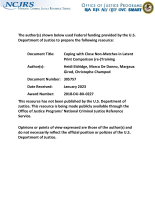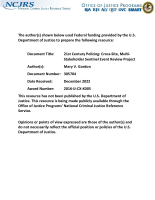Law Enforcement Community
Bystander Reporting to Prevent Violent Extremism and Targeted Violence; Learning from Practitioners
A LANDSCAPE REPORT ON MEASURING COMMUNITY SENTIMENT AND PERCEPTIONS OF SAFETY AND LAW ENFORCEMENT PERFORMANCE
Exploring the Guardian Mindset as a Strategy for Improving Police-Community Relations
A Whole Community Approach to Hate Crime Reduction: Research to Improve Prevention, Reporting, and Victim Support
Meeting National Safety Council Recommendations: Accurate Rapid Tests and Laboratory Confirmation Procedures for Fentanyl and Prevalent Opioids in Oral Fluid
Evaluation of Target Enrichment for SNP Genotyping of Skeletal Remains
What Works to Reduce Violent Gun Crime in Focused Deterrence Initiatives? Estimating the Effect of Services and Enforcement in Facilitating Desistence Among Prolific Violent Offenders
NIJ FY23 Center for Enhancing Research Capacity (CERC) at Minority Serving Institutions (MSIs)
2023 NIJ Research Conference Opening Ceremony
The theme of NIJ’s 2023 Research Conference was “evidence to action,” and our goal was to bring researchers and practitioners together to learn about the latest research evidence and how it can be implemented to promote safety, equity, and justice.
The opening ceremony included remarks from U.S. Attorney General Merrick B. Garland, Assistant Attorney General for the Office of Justice Programs Amy Solomon, and NIJ Director Nancy La Vigne.
See the YouTube Terms of Service and Google Privacy Policy
Coping with Close Non-Matches in Latent Print Comparison (re-)Training
21st Century Policing: Cross-Site, Multi-Stakeholder Sentinel Event Review Project
Expungement: Criminal Records as Reentry Barriers
Improve craniometric ancestry estimation with deep learning methods
What works to reduce violent gun crime in focused deterrence initiatives? Estimating the effect of services and enforcement in facilitating desistence among prolific violent offenders in Tampa
Support for Research, Testing, and Evaluation of Counter-Unmanned Aerial Systems in Law Enforcement Operations
Enhancing Supervision and Support for Released Prisoners
Application of the Social Learning Theory to Domestic Terrorist Recruitment
Modern Policing and the Control of Illegal Drugs: Testing New Strategies in Two American Cities
The Emergence of Lone Wolf Terrorism: Patterns of Behavior and Implications for Intervention
Implementing Youth Violence Reduction Strategies: Findings from a Scan of Youth Gun, Group, and Gang Violence Interventions
Community Reporting Thresholds: Sharing Information with Authorities Concerning Terrorism and Targeted Violence
U.S. National Footwear Database System Feasibility Study
Multilevel Evaluation of Project Safe Neighborhoods
Project Safe Neighborhoods (PSN) is a DOJ-sponsored initiative to reduce violent crime, particularly gun crime, by fostering cooperation by criminal justice agencies and local partners to develop and implement strategic approaches.
See the YouTube Terms of Service and Google Privacy Policy
NIJ-Funded Research on Firearms Violence in Urban Cities Advancing Scientific Evidence to Inform Practice
In this full thematic panel, renowned experts will present a series of papers summarizing the newest findings of NIJ-funded research projects on criminal offenses with firearms in urban areas. Researchers used various criminological and other theories, including routine activity theory, socio-ecological and socio-environmental perspectives, and advanced mixed-study methods, including surveys and spatio-temporal designs, to produce scientific evidence to inform practice.
See the YouTube Terms of Service and Google Privacy Policy







